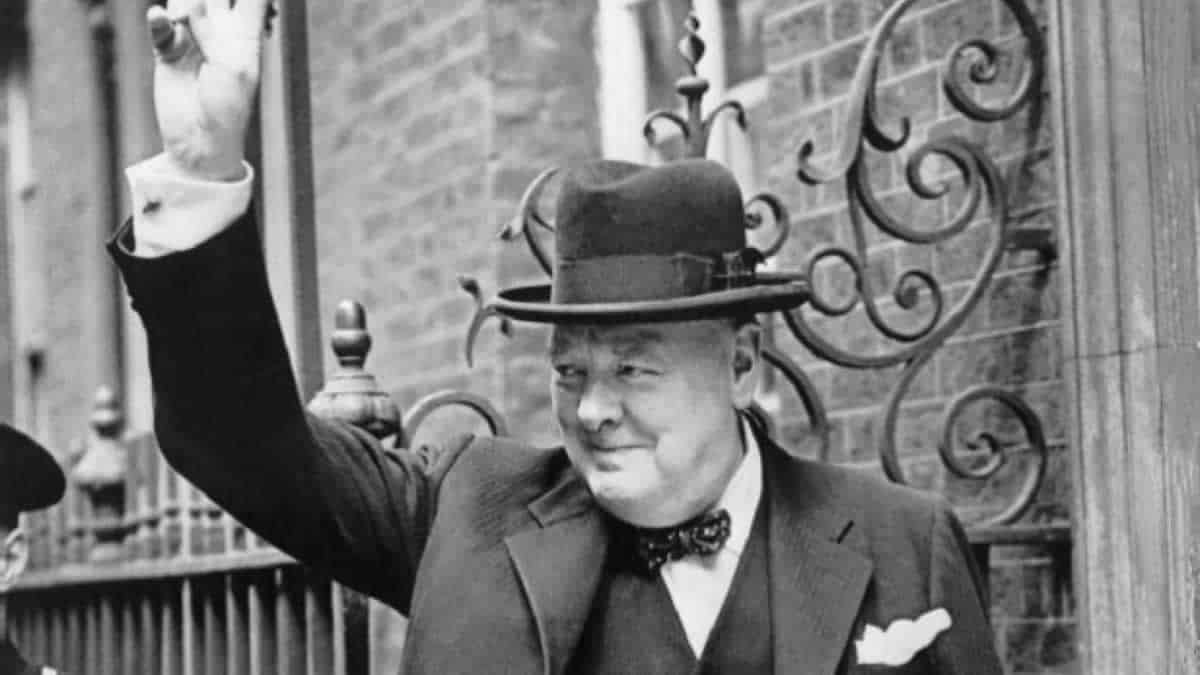Although British morale had been boosted by Churchill’s insistence “we shall fight on the beaches,” the situation in Europe continued to deteriorate over the next two weeks.
Italy entered the war on Germany’s side, putting further pressure on French borders and persuading the French leader Marshal Retain to seek peace with Germany at any price.
“However matters may go in France or with the French Government, or other French Governments, we in this Island and in the British Empire will never lose our sense of comradeship with the French people. If we arc now called upon to endure what they have been suffering, we shall emulate their courage, and if final victory rewards our toils they shall share the gains, aye. and freedom shall be restored to all.
Winston Churchill 18th June 1940
We abate nothing of our just demands; not one jot or tittle do we recede. Czechs, Poles, Norwegians, Dutch. Belgians have joined their causes to our own. All these shall be restored.
What General Weygand called the Battle of France is over. I expect that the Battle of Britain is about to begin. Upon this battle depends the survival of Christian civilization. Upon it depends our own British life, and the long continuity of our institutions and our Empire. The whole fury and might of the enemy must very soon be turned on us.
Hitler know s that he will have to break us in this Island or lose the war. If we can stand up to him. all Europe may be free and the life of the world may move forward into broad, sunlit uplands. But if we fail, then the whole world, including the United States, including all that we have known and cared for, w ill sink into the abyss of a new Dark Age made more sinister, and perhaps more protracted, by the lights of perverted science.
Let us therefore brace ourselves to our duties, and so bear ourselves that, if the British Empire and its Commonwealth last for a thousand years, men will still say, ‘This was their finest hour.’”
All of northern Europe now lay under German domination. Nothing stood between Hitler and Britain except the English Channel. “The Battle of France is over,” reported Winston Churchill to his fellow MPs on June 18, 19-10. “I expect that the Battle of Britain is about to begin.”
Churchill had personally flown to France a week earlier to urge its leaders to continue the light against Germany but to no avail. Now, from Bordeaux to Gdansk, Hitler controlled the entire European coastline from which he might launch an invasion of Britain. Having observed the relentless German advance over the past nine months, Churchill was under no illusions about the ferocity of any such attack “The whole fury and might of the enemy,” he predicted, “must very soon he turned on us.”
In his first speech as prime minister, Churchill had argued that this was a war between Britain and Germany, by declaring that the British Empire was at stake. Now, barely a month later, he found it prudent to stress that Britain was not isolated, despite the defeat or surrender of its allies. “We in this Island … will never lose our sense of comradeship with the French people”; “Czechs, Poles, Norwegians, Dutch, Belgians have joined their causes to our own. All these shall be restored.”
And not for the first time he reached out to the United States, which had so far been publicly neutral in the conflict. With Britain now in grave peril he suggested that even America was under threat from German aggression in Europe. “Hitler knows that he will have to break us in this Island or lose the war. … But if we fail, the whole world, including the United States, including all that we have known and cared for; will sink into the abyss of a new Dark Age.” In fact, America had already promised Britain to support it with arms; and the New World entered the war on December 8, 1941, after the Japanese attack on Pearl Harbor.
Meanwhile, it was Britain on her own resisting Hitler’s “perverted science” and seemingly unstoppable advance. After painting such a bleak picture of possibilities, Churchill concluded with a single sentence that defied ant’ red-blooded patriot not to stand up to the Nazi threat. “Let us, therefore, brace ourselves to our duties, and so bear ourselves, that if the British Empire and its Commonwealth last for a thousand years, men will still say, ‘This was their finest hour.’”
“Blood, toil, tears and sweat”; “we shall fight on the beaches”; “this was their finest hour.” The three speeches by Winston Churchill given in the month following his appointment as head of Britain’s wartime government defined the British character, both for Britons themselves and for the wider world. They inspired British civilians to endure personal discomfort and loss, and British troops not only to fight against an enemy but to fight for a cause.
Fearing Britain’s naval power; Hitler chose to launch his inevitable assault on Britain from the air a month after Churchill’s speech. The defence of Britain by its fighter pilots proved staunch; and by October, Germany had changed its tactics from aerial combat to blitz bombing of civilian populations. The failure of the Luftwaffe to disable the RAF in the Battle of Britain was Hitler’s first major defeat, the first proof that Germany was not invincible.
In August 1940, Churchill was moved to remark; “The gratitude of every home in our Island goes out to the British airmen. Never in the field of human conflict was so much owed by so many to so few.”



